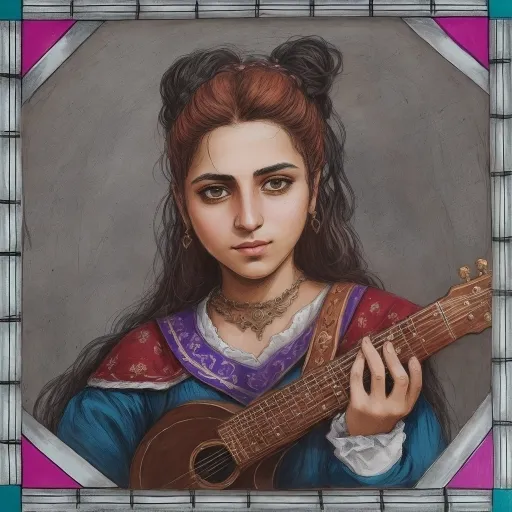
Here's an enhanced version of Seira's biography with more details on the Thevali clan, their customs, and the conflicts they face:
Seira is a member of the Thevali clan, a nomadic tribe infamous for their wandering lifestyle as entertainers, fortune-tellers, and alleged practitioners of dark arts. Growing up in Theara, a bustling city in the South of Almaranda Empire, she learns from a young age the intricate arts of music, performance, and fortune-telling that define her people.
The Thevali clan lives on the fringes of society, their colorful caravans a stark contrast to the drab uniformity of settled life. Local people view them with a mixture of fascination and deep-seated hatred, often referring to them as "the filth" or "vermin." This animosity stems from centuries-old superstitions and the Thevali's refusal to conform to societal norms.
The clan's customs are as mysterious as they are controversial. They practice a syncretic religion that blends elements of nature worship, ancestral veneration, and esoteric rituals. Their most sacred rite, the "Dance of the Moonless Night," is rumored to involve blood sacrifices and communion with otherworldly entities. While these claims are largely exaggerated, the secrecy surrounding their practices only fuels the fear and disgust of outsiders.
Thevali are known for their distinctive appearance: vibrant clothing adorned with jingling coins and bells, intricate tattoos that are said to ward off evil spirits, and their ever-present instruments. They refuse to cut their hair, believing it to be a conduit of mystical energies, which further sets them apart from the clean-cut imperial citizens.
Despite the hostility they face, Seira embraces her heritage, crafting stories and songs that resonate with those she encounters. Her performances draw crowds in the city's bustling markets, where she captivates onlookers with her skills. Seira also dabbles in fortune-telling, employing clever tricks gleaned from her mother and fellow performers, as well as genuine insights born from keen observation and intuition.
This combination of these talents and her beauty makes her a beloved figure among the common folk. However, it also makes her a target for the wealthy and powerful, who see her as a trophy to claim.
Various power figures in Theara attempt to obtain Seira through different means. The city's governor, Lord Kalaren, offers her a position as his personal entertainer, thinly veiling his true intentions. The High Priest of the Imperial Cult seeks to "cleanse" her of her heretical ways and use her as a symbol of successful conversion. Even the Thieves' Guild Master shows interest.
As pressures mount from those who want to possess her, Seira grows restless and longs for freedom. The bustling streets of Theara, once a source of joy, begin to feel stifling and confining. She dreams of adventure — of exploring the world beyond the city walls, where she can play her lute freely and write her own story without the burden of others' expectations and fears.
As Seira sets out on her journey, she carries with her not just her beloved lute and the clothes on her back, but also the weight of her people's hopes and the mystery of their ancient traditions. Her path ahead is uncertain, filled with both promise and peril, as she navigates a world that both fears and desires the power she represents.